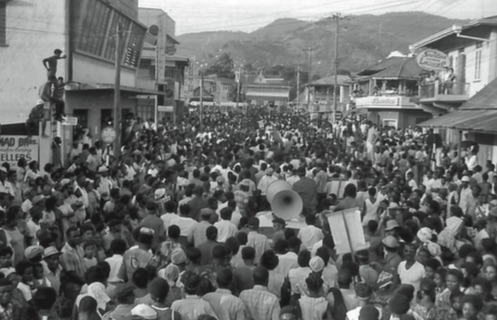Can a rallying cry for today’s youth come from an event that happened decades before they were born? This is the hope of historian and author Prof Brinsley Samaroo.

Prof Samaroo, former head of UWI St Augustine's Department of History, was speaking about the impact of 1970 Black Power Revolution.
It “changed the history of Trinidad and Tobago,” he said, "forever more and afterwards." On April 20 and 21, the revolution and its transformative power will be discussed at the Conference on the 50th Anniversary of the 1970 Black Power Revolution. The event is hosted by the Sir Arthur Lewis Institute of Social and Economic Studies (SALISES) in collaboration with the National Joint Action Committee (NJAC).
The Black Power Revolution, Prof Samaroo said, “alerted the ruling white elite in the country that after all, they're not in the majority”. He also credited Prime Minister Dr Eric Williams for promoting important societal changes because of it, such as transforming the sugar and oil industries. The revolutionary fire spread to other Caribbean countries like Grenada, Jamaica, and Guyana.
However, despite these pivotal moments, Prof Samaroo and his colleagues say the revolution receives little academic attention. It is not even taught in schools. The conference is meant to bring this history to the forefront. With this in mind, not only are the President of Trinidad and Tobago, the Prime Minister, the Chief Secretary of the Tobago House of Assembly and other government officials invited, but secondary school students, youth groups, and teachers as well.
He hopes young attendees will be inspired and energised: “Right now, with COVID-19 and all kinds of other problems, we are in a kind of state of depression.”
He adds that thousands of youths in the 1970s had a similar mindset, but believes education can stimulate national development and change people's minds about leaving Trinidad and Tobago and instead invest themselves in the country’s future.
Some of the themes suggested in the conferences call for papers include Afro-Indo unity in Trinidad and Tobago, cultural imperialism in the context of Black Power ideology, and contesting the internalisation of Christian and European attitudes and behaviour.
One of the most anticipated events will be a film and panel addressing the role women played in the revolution, a topic rarely discussed. There will be a display of pictures and articles, as well as a book sale of local authors and a sale of local delicacies.
The Conference on the 50th Anniversary of the 1970 Black Power Revolution will take place at Daaga Hall, the location where the revolution had its beginning under the leadership of activist, political leader, and UWI graduate, the late Makandal Daaga
Entry is free. E-mail salises@sta.uwi.edu for more information.